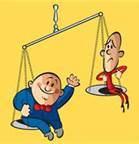I have discussed inequality before, but apparently haven’t succeeded in ending debate. The Economist (10/13) has published an analysis by its economics editor, Zanny Minton Beddoes, which I recommend highly. (Click here; and here for a related editorial). Beddoes addresses inequality in depth and concludes by calling for a true progressivism – not mindless capitalism-bashing (nor government-bashing) but a program for reforming government’s role to better spread capitalism’s benefits.*

A lot of inequality is merely the difference between mature people in the prime of their working lives, with accumulated assets, and young whippersnappers just starting out. Yet classic rich-versus-poor inequality of course exists too. It’s mitigated if the poor have reasonable opportunities to rise – the American ideal. But such social mobility isn’t what it once was. We’ll return to this.

Less affluent Americans are falling behind, in part, because some wealth is now being redirected from them to poorer people in Asia. Bad for us; good for them (at least equally deserving human beings). Thus, again, rising local inequality actually translates into falling global inequality.
Some Americans are losing out because they are becoming less competitive not only in what is more and more a global labor market, but even within America, where economic rewards increasingly go to the more skilled and educated.** Wealth is unequal not chiefly because the rich are hogs, or the game is rigged, but primarily because educational attainment is unequal, and its importance is growing. Once, anyone could earn good pay in factories without a college degree; but that’s sooo twentieth-century, an inexorably shrinking part of the economic landscape. (The President’s “manufacturing” obsession as a jobs panacea is retrograde.)

This is the nub of America’s inequality and declining social mobility.
Government isn’t helping. Our first battleground is in the schools, where entrenched teacher unions fight real reform of a system disgracefully disserving the disadvantaged, trapping them in their plight. And as for wealth redistribution, Beddoes highlights that it’s largely from the affluent to the affluent, especially the affluent elderly (through programs like Medicare, Social Security, and a host of tax preferences like the mortgage deduction). Such welfare for the rich dwarfs any redistribution to the needy.

This is a key element in the “true progressivism” Beddoes argues for. She says governments can narrow inequality without large-scale redistribution or an engorged state. Beddoes invokes Teddy Roosevelt’s trust-busting – instead of helping favored businesses, which often means hobbling their competitors, government should be removing barriers to competition (many of them erected by government itself). That expands economic opportunity and the size of the pie for everyone. While such an assault on cronyism and corruption is particularly vital for countries like India and China (where the state itself is directly in business), Beddoes says rich nations “also need more competition in traditionally mollycoddled sectors such as education.”
Health care too, in America. And (sorry, Lefties) we are increasingly over-regulated. Reviewing the regulatory picture, the same Economist issue quips that “If banks once did banking, now they practice law.” Fine for the biggest ones (maybe), but ruinously costly for all other businesses, again undermining competition, economic dynamism, and equality of opportunity. (A friend yesterday alerted me to a 1992 Wall Street Journal op-ed by a hotel owner telling how government regulation contributed to destroying his business. The author: George McGovern!)

Beddoes’s third priority is to reform taxes, to improve efficiency and fairness. While the rich do already pay a disproportionately high share of income taxes, our crazy-quilt of loopholes and special interest giveaways is loaded with unfairness and distortions of economic activity that seriously harm the nation’s welfare. Just the sheer cost in man-hours of coping with tax complexity is a huge economic liability.
All these policies would help reduce inequality and broaden economic opportunity; but of course they are good not just for the disadvantaged, but for society as a whole.
Beddoes concludes by noting that some rising countries are progressing on parts of this agenda (one reason why they are rising); but not the richer nations, and “the most shocking shortcomings are in America, the rich country where income gaps are biggest and have increased fastest.”

I remain a great optimist about the future for humanity as a whole. But while America is still blessed with a vast reservoir of human creative energy, God has not somehow decreed that we will maintain our privileged status even while refusing to adapt to a changing world. I’m not optimistic about America biting Beddoes’s bullets.
It surely will never happen in a second Obama term. With Romney, and a fresh shuffle of the political cards, maybe there’s at least a chance.
* The blogosphere’s Lefties have mounted the predictable shrill attacks on The Economist for daring to call its prescriptions “progressive.”
** Broadened educational opportunity was probably the key reason why American inequality fell significantly in the last century.
